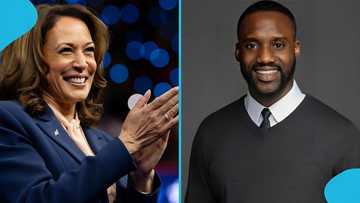US Visa Restriction Policy Offers Avenue For Reflection On Health Of Ghana's Democracy
Ghana is one of the few countries facing visa restrictions from the US for people who undermine the election process. Analysts believe this should prompt reflection on the trajectory of election management and the health of the country's democracy.
PAY ATTENTION: Got a Minute? Complete Our Quick Survey About YEN.com.gh!
Unprecedented. That’s the word Professor H. Kwasi Prempeh, the executive director of Ghana's Center for Democratic Development (CDD-Ghana), used to describe America's new visa restriction policy for people deemed responsible for undermining democracy in Ghana ahead of the December elections.
With this policy, the US has said it is demonstrating its commitment to ensuring that Ghana passes its ninth successive election with relative stability. Ghana has long been praised for its election conduct, including three power transfers between rival political parties.

Source: Getty Images
According to the US Department of State, this visa restriction policy would only apply to people found to have undermined democracy through the manipulation or rigging of the electoral process, the use of violence for intimidation, and other human rights abuses within the context of elections.

Read also
Equatorial Guinea govt restricts WhatsApp media amid Baltasar Engonga's 400 adult videos scandal
The policy affects specific individuals involved and their immediate family members. The US has previously implemented similar visa restrictions in other nations to safeguard democratic integrity, including in Nigeria ahead of the 2023 general election, where it said some unnamed persons were affected by sanctions.
However, this policy appears to raise more questions than offer assurances for Ghana's democracy. Prempeh noted to YEN.com.gh that it remains unclear how exactly the US plans to single out persons it perceives to have undermined democracy.
“It is not clear, however, on what or whose evidence the US Department of State intends to rely upon to make a determination as to the applicability of this sanction."
He further noted the questionable independence of Ghana's law enforcement and judiciary, which could raise credibility concerns if the US were using the state apparatus to reach conclusions.
“Given government's control of the security agencies and the AG's prosecutorial function, and how these institutions and powers are used selectively and often in a partisan way… there are legitimate questions or concerns as to how and how fairly and impartially these sanctions would be determined in practice.

Read also
"US Election 2024": Meet Harrison Poku, Ghanaian man in US promoting Kamala Harris' presidential bid
Ghana's ailing democracy
Afrobarometer’s scorecard for democracy in Ghana showed that satisfaction with democracy in Ghana had dropped from a high of 28% in 2017 to 51% in 2022.
Prempeh acknowledged that other threats to democracy manifest outside the confines of elections, such as corruption.
But he suggested that the US may be cutting its coat according to its cloth with an election-focused warning.
“…I suppose it's easier to focus the sanctions on that than on other everyday or general threats to democracy.”
The opposition National Democratic Congress (NDC) certainly believes the Nana Akufo-Addo administration and the New Patriotic Party have significantly undermined democracy in Ghana.
In line with the Afrobarometer trends, a member of the NDC’s communications team, Perry Arhin Annan, accused the Akufo-Addo administration of playing a part in eroding Ghana’s democracy.
The government has come under fire for its crackdown on protestors over the last few years, as well as concerns that it has undermined the independence of democratic institutions like the Auditor General’s Department and the Office of the Special Prosecutor.

Source: Getty Images
The opposition has also accused the Akufo-Addo administration of trying to rig the December elections in favour of the governing New Patriotic Party and its presidential candidate, Dr Mahamudu Bawumia.
Annan's party held nationwide protests demanding an independent audit of the voters' register amid claims of thousands of irregularities. In October, an Afrobarometer report indicated that only 28% of Ghanaians expressed trust in the Electoral Commission, a drop from 59% in 2012.
While Annan welcomes the threat of sanctions on bad actors, he believes there is a surer bet to safeguard Ghana’s democracy.
“It is about us, the Ghanaians, voting them [the New Patriotic Party] out so that we get quality leadership, leadership that will think about the democracy.”
A marker of regression in election management
The evident tensions heading into the polls lead Ewald Garr, a governance analyst, to surmise that the US warning is coming at the right time.
"It is sending a strong signal and caution to the people who may think they can do anything and get away with it."
However, Garr noted that the US visa restriction policy should prompt some concerns about lapses in our election management.
Garr noted, for example, the pockets of violence that marred the 2020 election, leading to at least five deaths and other casualties.
He explained that these were symptoms of people putting partisan interests ahead of the public interest.
"There is something wrong somewhere, and people need to know that is not the way we should go," said Garr. "People should be reminded that we have fallen and gone the wrong way, and we need to get back on track.”
New feature: Сheck out news that is picked for YOU ➡️ click on “Recommended for you” and enjoy!
Source: YEN.com.gh



